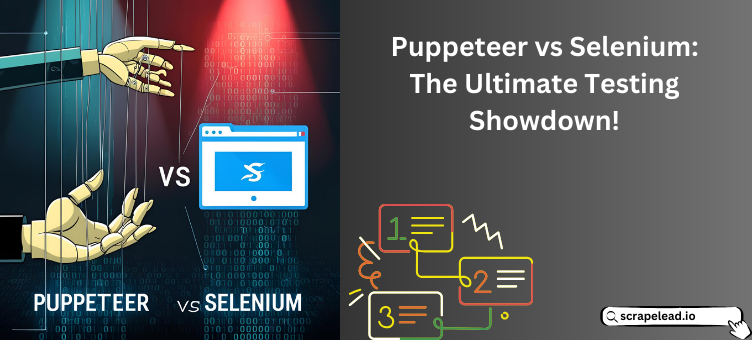Puppeteer vs Selenium: The Ultimate Testing Showdown!
 ScrapeLead
ScrapeLead
When automated browser testing comes into the picture, two heavyweights rule the game: Puppeteer and Selenium. Whether you are a developer, QA engineer, or automation evangelist, selecting the ideal tool can make all the difference in efficiency and accuracy while testing.
In this blog, we will contrast Puppeteer vs Selenium based on performance, user-friendliness, features, and best use cases so that you can make a well-informed choice.
What is Puppeteer?
Puppeteer is a Node.js library developed by Google that provides a high-level API to control headless Chrome or Chromium. It is widely used for web scraping, testing, and automation tasks.
Key Features of Puppeteer:
Headless & Headful Mode – Run tests in the background or with a visible browser.
Fast Execution – Optimized for Chrome, reducing latency.
Modern JavaScript Support – Fully supports ES6+.
Built-in Screenshot & PDF Generation – Useful for UI testing and reporting.
Network Interception – Allows manipulation of network requests and responses.
What is Selenium?
Selenium is a popular open-source tool for automating web browsers. It supports multiple programming languages (Python, Java, C#, Ruby, etc.) and is widely used for cross-browser testing.
Key Features of Selenium:
Multi-Browser Support – Works with Chrome, Firefox, Safari, Edge, and more.
Language Flexibility – Write tests in multiple programming languages.
Third-Party Integrations – Easily integrates with frameworks like TestNG and JUnit.
Large Community Support – A well-established tool with extensive documentation.
Parallel Test Execution – Supports grid execution for faster testing.
Puppeteer vs Selenium: Head-to-Head Comparison
| Feature | Puppeteer | Selenium |
| Supported Browsers | Chrome, Chromium | Chrome, Firefox, Safari, Edge, IE |
| Programming Languages | JavaScript, TypeScript | Python, Java, C#, Ruby, JavaScript |
| Execution Speed | Faster (Optimized for Chrome) | Slower (Supports multiple browsers) |
| Ease of Setup | Easier (Single package) | Complex (Requires WebDriver setup) |
| Cross-Browser Testing | No | Yes |
| Best For | Web scraping, UI testing, automation | Cross-browser testing, enterprise applications |
When to Use Puppeteer?
Ideal Use Cases:
Web Scraping – Extract data efficiently from web pages.
Headless Testing – Automate Chrome without UI overhead.
Performance Monitoring – Measure website speed and performance.
Single Browser Testing – If you only need Chrome-based testing, Puppeteer is faster.
Pros:
Faster execution in headless mode.
Simplified API for modern JavaScript developers.
Great for web automation and scraping.
Cons:
Limited to Chrome and Chromium.
Less community support compared to Selenium.
When to Use Selenium?
Ideal Use Cases:
Cross-Browser Testing – Test websites across multiple browsers.
Enterprise-Level Automation – Integrates with existing testing frameworks.
Regression Testing – Best suited for large-scale testing environments.
Compatibility Testing – Ensures website works across different OS and browsers.
Pros:
Supports multiple browsers.
Works with multiple programming languages.
Strong community and documentation support.
Cons:
Slower execution compared to Puppeteer.
WebDriver setup can be complex.
Which One Should You Choose?
The choice between Puppeteer and Selenium depends on your specific needs:
If you need fast and lightweight automation for Chrome, go with Puppeteer.
If you require cross-browser testing and multi-language support, Selenium is the better choice.
Quick Decision Guide:
For speed and simplicity → Choose Puppeteer.
For broad browser compatibility → Choose Selenium.
Conclusion
Both Selenium and Puppeteer are great browser automation tools, but they are used for different things. Puppeteer is best for Chrome-based automation, while Selenium is the preferred choice for cross-browser testing.
Do you use one of these tools? Share with us in the comments! Don't forget to share this post with other developers and testers who may benefit from it.
Happy testing!
Know More >> https://scrapelead.io/blog/puppeteer-vs-selenium-the-ultimate-testing-showdown/
Subscribe to my newsletter
Read articles from ScrapeLead directly inside your inbox. Subscribe to the newsletter, and don't miss out.
Written by

ScrapeLead
ScrapeLead
Scrape Any Website and Connect With Your Popular Apps It’s easy to connect your data to thousands of apps, including Google Sheets and Airtable. You can utilize Zapier, http://scrapelead.io’s API, and more for smooth data sharing and integration across multiple platforms.